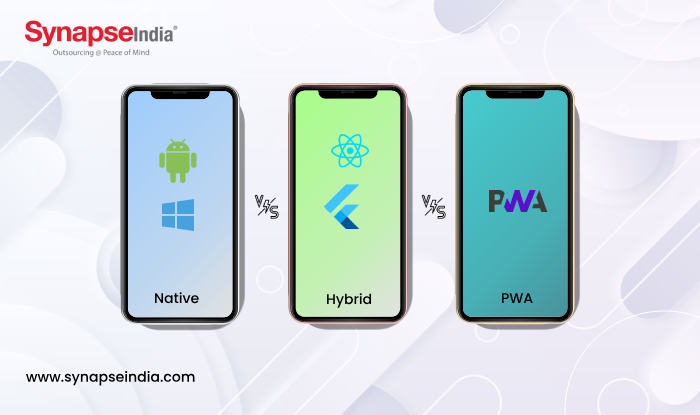 30 May 2024
30 May 2024“PWAs run in web browsers offering offline capabilities, Native apps are platform-specific with superior performance, and Hybrid apps use a single codebase for cross-platform compatibility but may compromise performance.”

To provide the best possible speed, functionality, and user experience, developers must carefully consider the advantages and disadvantages of each platform and technology, including native, hybrid, and progressive web apps (PWAs).
The advantages and trade-offs of native, hybrid, and PWA techniques vary based on development time, cost, performance, and platform compatibility, among other considerations. This blog post will discuss the distinctions between native, hybrid, and PWA development methodologies, highlighting their salient features, advantages, and applications. Businesses can secure the success of their mobile app initiatives in today's competitive market by knowing the advantages and disadvantages of each technique.

An Introduction to Native and its Features
The term "native mobile app development" describes the process of employing platform-specific programming languages and development tools to create applications that are specifically designed for a single platform, like iOS or Android. Native apps are developed using the native SDKs (Software Development Kits) supplied by the platform vendors, in contrast to hybrid or web-based apps. This enables developers to fully utilize the capabilities of the underlying operating system and device hardware.
As native apps can access device hardware directly and take advantage of platform-specific optimizations, they usually run better than hybrid or web apps.
Native apps offer a smooth and user-friendly experience that meets users' expectations by following the design principles and UX conventions of each platform.
Developers can create feature-rich and dynamic experiences with native apps since they have access to a multitude of device functions, including the accelerometer, GPS, camera, and push notifications.
An Introduction to Hybrid and its Features
With the help of hybrid mobile app development, developers may design applications that work on many platforms with a single codebase by combining aspects of web and native app development. Hybrid apps are usually created using web technologies like HTML, CSS, and JavaScript, as opposed to native apps, which are created using platform-specific languages like Swift or Java. After that, these programs are placed inside a native container, which enables cross-platform deployment.
With a single codebase, hybrid apps can be implemented on several platforms, such as web browsers, iOS, and Android. When opposed to developing distinct native apps for each device, this considerably cuts down on development time and effort.
Compared to native apps, hybrid apps frequently use fewer resources and have cheaper development costs because they can be created with web technologies and shared code.
By enabling developers to write code only once and distribute it across several platforms, hybrid app development simplifies the development process. Faster time-to-market and more effective iteration cycles are the outcomes of this.
Progressive Web Apps (PWAs) are a cutting-edge method of creating web applications that provide users with a native app-like experience. PWAs, as opposed to traditional web apps, take advantage of contemporary web technology and design concepts to offer improved performance, offline functionality, and a consistent user experience across platforms.

PWAs are made to function flawlessly on all types of devices, including tablets, smartphones, and desktop computers. They provide a consistent user experience across devices by adjusting to various screen sizes and orientations.
PWAs provide users with a native app-like experience, complete with full-screen mode, push notifications, and home screen installation. This enhances user retention and engagement.
The fact that PWAs may function offline or with poor network conditions is one of their most important advantages. PWAs enable users to access the essential functions of the app even when they are not connected by using service workers to cache content and resources.
| Aspect | Native Apps | Hybrid Apps | Progressive Web Apps (PWAs) |
|---|---|---|---|
| Development Language | Platform-specific | Web technologies (HTML, CSS, JavaScript) | Web technologies (HTML, CSS, JavaScript) |
| Installation | Download from the app store | Download from the app store | Installable via browser |
| Access to Device APIs | Full access | Limited access | Limited access |
| Performance | High | Moderate | Moderate to High |
| Offline Functionality | Yes | Limited | Yes |
| User Experience | Native | Hybrid (mix of native and web) | Native-like |
| Development Cost | High | Moderate | Low |
| Maintenance | Platform-specific | Single codebase | Single codebase |
| Discoverability | App store visibility | App store visibility | Search engine discoverability |
It's important to thoroughly consider the benefits and drawbacks of native, hybrid, and PWA choices when deciding which development strategy is best for your app. Although native apps require different codebases for each platform, they offer better performance and complete access to device capabilities. Using a single codebase to speed development is possible with hybrid apps, but performance and access to specific device features may be compromised. Conversely, PWAs offer shorter deployment times and cross-platform compatibility, although they might not have all native features. To ensure that your choice is in line with your aims and goals, take into account your project's specifications, budget, schedule, and target audience. Whether you choose with native, hybrid, or PWA development, the most important thing should always be to prioritize satisfying your consumers' needs and providing a seamless user experience.


